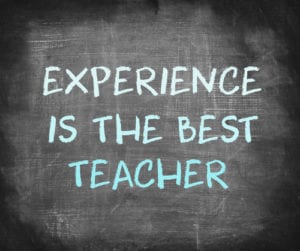Albert Einstein is one of the most remarkable figures in the field of science. Having revolutionized the way humans think about the universe, Einstein’s philosophies and teachings made him the most influential physicist of the 20th century. Who doesn’t know the famous equation “E=mc2, one of his greatest scientific discoveries for the Theory of Relativity? This formula has given birth to a lot of scientific findings including Newton’s Three Laws of Motion.
Although predominantly recognized as the world’s greatest scientist, Einstein is also a great educational philosopher during his time—and his teachings ring true to this day. While he spent time discovering different scientific philosophies, he also formulated ideas and quotes to live by that, even in modern times, are highly applicable. In more ways than one, many of his philosophies strongly resonate with the perspectives and principles of online education.
Here are 11 of Einstein’s Philosophies that online learning today can take helpful hints and inspiration from:
“I have no special talent. I am only passionately curious.”
What it Means: Pair your curiosity with passion and find ways to satisfy both.

One of the most popular philosophies of Einstein talks about having a purpose or passion in life. And how does this relate to modern online teaching?
Distance education may have gained traction in recent years with a tremendous rise in acceptance from society; however, it is yet to reach a level of popularity that is at par with traditional on-campus learning. As different perceptions about online learning arise, it is easy to get discouraged or feel belittled. As a result, a student no may no longer feel motivated to finish what’s been started.
What does Einstein’s educational philosophy say about this? For the great genius, students and teachers need to be passionate in whatever path they choose—and nothing else will matter as much. As long as there is that burning desire to get educated regardless of the circumstances, there should be no stopping anyone from passionately learning and discovering. After all, there are so many resources online that you can use to educate and learn things.
Teachers don’t need to be multi-talented or multi-skilled at something to excel in life. It is true that talent beats hard work; however, it is nothing without a sense of burning passion. Being a teacher, whether online or classroom-based, is one of the most rewarding professions that make a lasting impact on mankind.
“A person who never made a mistake never tried anything new.”
What it means: Never be afraid to make mistakes.

This quote applies to online teaching and learning. As cliché as it sounds, nobody is really perfect; everybody makes mistakes!
There is always that myth surrounding educational instruction: people expect teachers to know everything. However, mistakes are inevitable in the field of online teaching. Online teaching strategies may or may not work and there is always room for improvement. Instructors learn from it, correct their strategies, move forward, and do better. Needless to say, learning from your mistakes molds you into becoming a better teacher.
As students, it is natural to commit mistakes when dealing with something new and unfamiliar. The remedy? Never hesitate to ask questions. You will be surprised how much you can learn from simply asking.
“I am thankful to all those who said no. It’s because of them, I did it myself.”
What it means: Determination goes a long way.

Do you ever feel like the world is against you, or that no one believes in you? At some point in our lives, we have to walk the journey on our own. While it is true that teaching as a profession is a life-changing undertaking, there are also times when you have no one else to rely on but yourself. As an online teacher, you may be no stranger to criticisms and negative opinions that plant in your seeds of uncertainty about your career of choice. Einstein suggests to pay no mind to these doubts; do not let the noise of people affect your passion or principles in life.
Online learners will meet people who are skeptical about online education. Human as we are, we feel resentful and easily get demotivated. Little do we know that these people are only trying to bring us down because they’re struggling with their own goals! Their discouragement should fuel your determination to succeed. One of the most accomplishing feelings springs from the knowledge that you are able to prove yourself and your critics that you are an achiever.
“Life is like riding a bicycle. To keep your balance, you must keep moving.”
What it means: Balance is key.

This Einstein philosophy plays a critical role in keeping your life-work balance. This applies to online education, too. Even as distance learning gives you a sense of freedom to study or earn a degree at your own pace, no one escapes the challenge that comes with juggling work and personal life! Like any other profession, online teaching comes with obstacles. Teachers can become easily tired and unenthusiastic.
Students go through the same hurdles. Factors such as family, friends, financial hurdles, job challenges, and tough schedules get in the way of study habits. All these can result in slacking and the inability to prioritize obligations. If you feel like being bombarded or overwhelmed by the things around you, learn to take a break.
Striking a balance is critical to your success in distance education. Einstein says the only way is to keep moving forward. And with online education, you do that at a pace you are comfortable with.
Some of the most practical recommendations in maintaining balance for students who opt for online courses are:
- managing assignments
- avoiding procrastination
- taking personal time off
- eliminating distractions
“Information is not knowledge. The only source of knowledge is experience.”
What it means: Experience is the best teacher.

While online content, researching, podcasts, and eBooks are easily accessible and readable online, nothing beats learning from firsthand experience. If you have an authentic story, you can be sure it is more compelling and more interesting to tell or narrate it than read it as published content. Online course materials are available at your disposal but teachers need to create strategies that compel students to make good use of the information they gather. Connecting by experience allows online instructors and students to comprehend, and retain information better.
Research suggests that learning through hands-on activities and practical exams are better at promoting eagerness to learn in students than purely researching or reading.
“If you can’t explain it simply, you don’t understand it well enough.”
What it means: Be an effective teacher.

This is a straightforward philosophy applicable to online teaching.
Some courses a breeze to learn for some students but there are also more complicated subjects that take a lot of time to figure out. If you are an online instructor who is already a subject matter expertise, you can alleviate this pressing problem by “teaching from a student’s perspective”.
In online teaching, or in all educational instruction for that matter, instructors should never assume students have prior knowledge. Each student is unique with different learning curves–in an eLearning environment included. Simply put, a teacher needs to impart knowledge to students in a manner that makes it easy for them to grasp. This way, learning becomes more meaningful and worthwhile.
“Everything should be as simple as it is, but not simpler.”
What it means: Keep it simple.

There are different strategies formulated by online teachers. While there are vast sources of learning all throughout the internet, creating lesson plans, curricula, or even outlines can become tricky. One of the challenges is to keep things simple without losing the key points or adding unnecessary content.
Students who are new to a lesson will naturally get confused. Many would find it hard to wrap their heads around complex concepts. The simpler and more concise teaching instructions are, the more comprehensible the topic will be for students.
“It is the supreme art of the teacher to awaken joy in creative expression and knowledge.”
What it means: Teaching is a beautiful art.

Being an online teacher is one of the noblest and most creative professions nowadays. Being able to work anywhere around the world with students who can access educational materials anywhere makes online teaching a unique experience.
A teacher’s enthusiasm is evident in the way they deliver their lessons and the positivity they exude. It is also reflected in students’ behavior towards studying. Similar to the effects of hands-on learning, student motivation directly correlates with the teacher’s attitude.
“Everyone is a genius. But if you judge a fish on its ability to climb a tree, it will live its whole life believing it is stupid.”
What it means: Stop comparing yourself to others.

This valuable philosophy from Einstein reminds us to be the best version of ourselves. Both students and teachers are not meant to live up to society’s standards; we each have our own unique journeys and timelines. We are capable in different ways. We are unique. It’s time to stop the comparison trap.
The point is, not all of us are meant to be entertainers, performers, athletes, politicians, and entrepreneurs. If your life goals or journey is like that of everyone else, imagine what a boring world it would be!
What does this say about online education? Online instructors have their own cup of tea. Some are excellent enough to effortlessly teach even the most complicated lessons. The same goes for e-learners. An online student may not be the best at mathematical equations but they may excel in other fields of study. Isn’t it what making online degree choices is all about?
Develop your skills to reach your highest potential. Have an objective in life, dream big, and work for it. But as Einstein’s philosophy emphasizes, never be too hard on yourself if your plans pan out poorly or you don’t produce results at all.
“I never think of the future – it comes soon enough.”
What it means: Live in the present moment.

Most people are guilty of being too worried about the future. Some, on the other hand, are too attached to their past. Either way makes it difficult to appreciate and be happy with the present moment.
This philosophical viewpoint of Einstein also applies to online learning. Teachers are often bothered by financial obligations, personal commitments, career uncertainties, and a waning passion for the profession. When instructors are constantly worried about where they are heading, teaching as a professional duty becomes a real challenge.
Some students worry about completing their degree time or imminent failure. The lack of support from family and financial hurdles also makes them less focused on studying. The truth is, worrying does not change the situation; it only creates non-existent (and often highly unlikely) scenarios in their head.
A study recommends mindfulness to divert your attention to what actually is here, such as that online degree waiting to be completed and fundamentally, just your life that is waiting to be lived.
“Strive not to be a success, but rather to be of value.”
What it means: Make a difference.

This idea speaks volumes about the way to define success. For some, success is having a supportive family by their side; to some, it is all about enjoying a decent and well-paying career. Material or immaterial, there is no absolute measure of success. To Einstein, what you make out of these accomplishments matter more.
But how do we apply this philosophy to distance education? A study reveals that students measure success by the social and residential factors, life management, academic achievements, and active engagements.
In the online teaching profession, teachers strive to impart knowledge to students, develop their skills, and instill the right attitude in them so they are equipped to perform in highly competitive and tough career paths.
A teacher’s success can be one that is continuously transforming. Online students’ learning progress, which can be indicative of how they would fare in the real world as graduates, is an instructor’s genuine yardstick of success.
Without a doubt, Albert Einstein’s philosophies and principles are now being defined from a different standpoint. The impact of his work is not just confined to the sciences. Be it in pushing people to believe in themselves, influencing them to pursue their passion, prompting them to own up to their mistakes, encouraging them to move forward, or making them see success from a different light, Albert Einstein’s wisdom has transcended the academic realm.
Among the different valuable philosophies of Albert Einstein we mentioned, which resonates with you best as an online teacher or online student?
